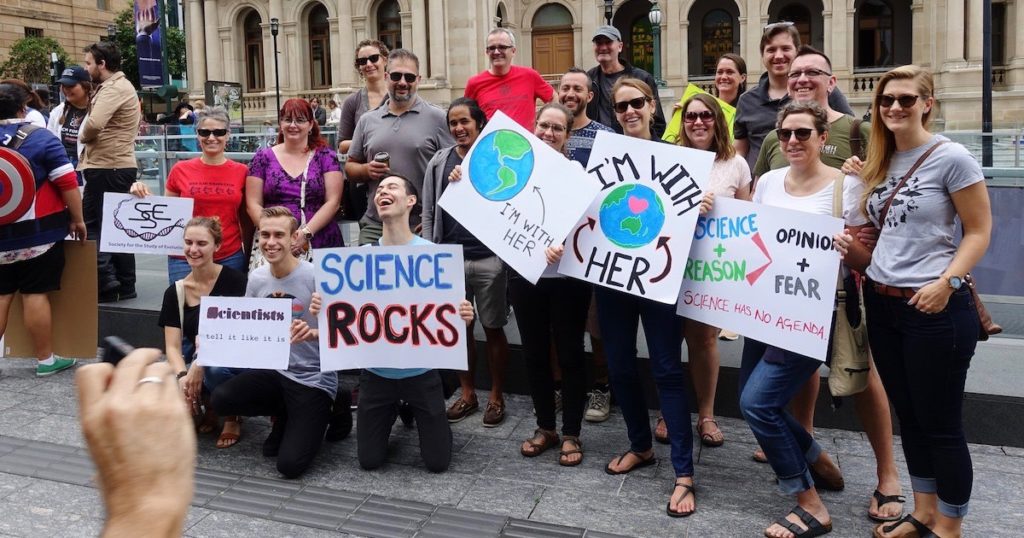 Culture & Ethics
Culture & Ethics
 Physics, Earth & Space
Physics, Earth & Space
As Trust in Science Sinks, Prestigious Journal Decides to Showcase Yet Another Politicized Scientist

As trust in our institutions — including science — sinks, the world’s most prestigious professional journals keep churning out ideological tracts that undermine necessary scientific objectivity.
Terrified of Climate Change
Nature — perhaps the world’s most prestigious science journal — just published a screed in which a scientist urges colleagues to take “direct action” to convince us that radical change must be instituted now to save the planet from climate change. The author, astronomer Bernadette Rogers, is terrified of climate change and left her work in that field to pursue radical political advocacy. From, “The Climate Emergency Demands Scientists Take Action and Here’s How”
I left my job as Head of Science Operations at the Gemini South Observatory in 2014, driven to ‘do more’ about the climate crisis. Within two years I was board chair of the Portland chapter of 350.org, and I was arrested on railroad tracks in Clark County, Washington, protesting after a dangerous oil train derailment occurred in Mosier, Oregon. In the past decade, I’ve worked with ten different climate organizations, in all kinds of roles: marcher, organizer, speaker, treasurer, fundraiser, grant writer, board director and arrestee. Although none of this was planned, the biggest surprise perhaps has been the personal growth, rich relationships, and sense of purpose I have gained along the way.
Rogers is also part of Extinction Rebellion. You know who these fanatics are: They block traffic, break windows, throw blood on banks, that kind of “constructive” protest, to save the planet. Rogers is clearly a radical ideologue — which is fine, we all have our causes — but not exactly the kind of rational scientist one expects to see published in a prestigious science journal.
Rogers isn’t satisfied with the current pace of change:
There is no evidence we have crossed a threshold of no return, but it is clear we have waited too long for incremental change. Massive and rapid transformation is required. To convey this message, scientists must do more than talk.
She urges scientists to use their authority to convince a skeptical public that extreme action ending the use of fossil fuels is warranted. The resulting tremendous harm to the economy and people’s thriving throughout the world that would cause isn’t even worth a mention. Nor, tellingly, does she advocate for nuclear power that emits zero carbon into the atmosphere.
Go Get Arrested!
Then, she urges the boldest scientists to get arrested to save the planet:
Throughout history, non-violent civil disobedience has proven to be an effective tool for massive social change. Acts of moral defiance show extraordinary commitment and command attention, particularly when done by highly respected professionals like scientists. Scientist Rebellion is a direct-action organization doing things like wheat-pasting scientific papers on banks and oil company headquarters, protesting private jets at airports, disrupting scientific conferences, political events and, sometimes, traffic. These actions are more risky, sometimes even dangerous, and so each person must assess their own ability to participate. For those with social privilege, getting arrested often car[1]ries less risk. However, it is not necessary to get arrested to support this level of action. There are many legal support roles: legal observer, jail support, coordinator, fundraiser, media contact. Amplifying and defending civil disobedience also helps the cause.
Bah. I can’t think of anything more harmful to people’s respect for “science” than having hysterical scientists in (say) lab coats preventing people from getting to work by blocking traffic “to save the planet.” Or how about gluing oneself to — or throwing soup on — great art? That’s the ticket! It’s getting cooler already.
When Nature at least impliedly grants its imprimatur to explicit advocacy for criminality, it doesn’t save the planet. But it does harm its own reputation specifically, and that of climate science generally. And it adds great heft to the charge recently made by climate scientist Patrick T. Brown, that being published about climate change in the world’s most prestigious journals requires scientists to tailor their thesis to fit the reigning climate emergency narrative.
Cross-posted at National Review.
